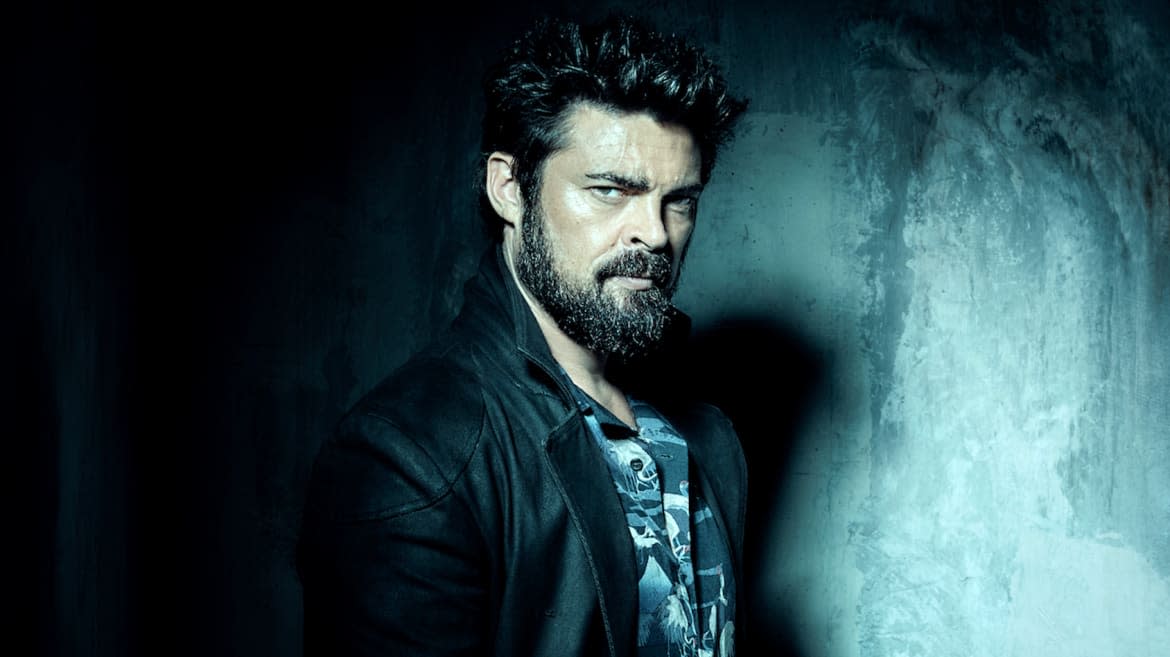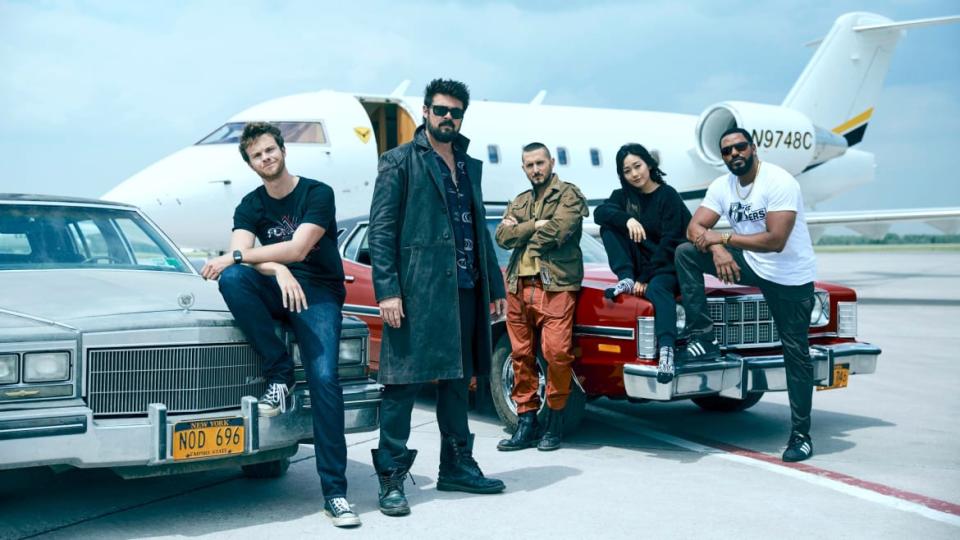‘The Boys’ Star Karl Urban Talks Butcher, Bond Rumors, and Why 9/11 Firefighters Are the Real Superheroes

- Oops!Something went wrong.Please try again later.
- Oops!Something went wrong.Please try again later.
- Oops!Something went wrong.Please try again later.
- Oops!Something went wrong.Please try again later.
- Oops!Something went wrong.Please try again later.
- Oops!Something went wrong.Please try again later.
- Oops!Something went wrong.Please try again later.
- Oops!Something went wrong.Please try again later.
The tide of American fascism is rising both in reality and, consequently, in The Boys, Amazon’s deliriously deconstructionist superhero saga (based on Garth Ennis and Darick Robertson’s comic book series, developed by Eric Kripke, and produced by Seth Rogen and Evan Goldberg) about misfit do-gooders whose fantastical abilities are the byproduct of Compound-V, a cutting-edge drug pioneered by evil conglomerate Vought International. In this perilous new world, the only thing standing in the way of an authoritarian dystopia is Karl Urban’s Billy Butcher, a profane rogue with a personal vendetta against the U.S.’s twisted, jingoistic Superman proxy Homelander (Antony Starr), as well as a deep abiding hatred of all things related to that foe’s corporate Justice League, The Seven.
With a creatively florid expletive at the constant ready, and a mischievous twinkle in his eye that spells insanely dangerous things ahead for his anti-supe brigade The Boys—comprised of Hughie (Jack Quaid), Mother’s Milk (Laz Alonso), Frenchie (Tomer Capone) and Kimiko (Karen Fukuhara)—Butcher is a madman with few limits and even fewer you-know-whats to give. Uncouth, volatile and tormented, he’s the extreme embodiment of 21st-century TV antiheroism, and he once again shines in the show’s third season (out now), which finds Butcher and his comrades searching for a mysterious weapon that supposedly killed famed Captain America-ish supe Soldier Boy (Jensen Ackles), and thus might be a means of stopping Homelander once and for all. Unsurprisingly, that plan proves more difficult than it initially appears, compelling Butcher to flirt with the dark side (via a temporary version of Compound-V) and, in arguably the eight-episode run’s wildest installment, to immerse himself in a famous bacchanalian festivity known as Herogasm.
‘The Boys’ Season 3 Lays Waste to Gun Nuts and the Alt-Right
For the 49-year-old New Zealand native, Butcher is the role of a lifetime, one that takes full advantage of not only his formidable physical presence but also his razor-sharp comedic timing. A veteran of countless blockbuster projects from the past 20 years—including The Lord of the Rings, the J.J. Abrams-led Star Trek reboots, The Chronicles of Riddick, Thor: Ragnarok, and the Alex Garland-penned cult classic Dredd—Urban is a character actor in a leading man’s imposing frame, and the kind of magnetic presence that elevates any sort of genre effort. That’s been thrillingly proven by The Boys, a gonzo series that leans heavily on Urban’s devilish charisma. Affording him the opportunity to take center stage while simultaneously collaborating with one of the small-screen’s finest ensembles, it’s the ideal vehicle for the actor, as well as one whose portrait of ordinary and extraordinary dysfunction grows more relevant with each passing day.
Ahead of the Prime Video hit’s Season 3 debut, we chatted with the star about superhero perversion, The Boys’ finger-on-the-pulse timeliness, and whether any other high-profile gigs—more Star Trek? A Dredd sequel? 007?—might be in his future.
Given The Boys’ depiction of superpowers as something of a curse—and one tailor-made for rageaholics, sexual deviants, egomaniacs and Nazi psychopaths—would you want them yourself?
I think that the superpowered characters in the show are a metaphor for many contemporary morally-bankrupt celebrities, politicians, and athletes, and the show does what great sci-fi and fantasy genre shows do, and that is take a view and a lens on our culture and our society, and just sort of frames it in a different way. Certainly, if history is anything to go by, the old adage is true: with absolute power comes the absolute certainty that it could go sideways at any time.
This season gets into fascism, fake news, Second Amendment fanatics, and the bleaker ideas that the only way to defeat evil is by partaking in it, and that people might like authoritarianism far more than they want democracy. Are you stunned and/or saddened by how timely the show remains?
It doesn’t surprise me, because the writers write about things that concern them in society and modern culture, and it’s a sad indictment that, when they’re writing the show two years ago, those issues are just as relevant today as they were then. Whether it’s talking about the #MeToo movement, Black Lives Matter, the rise of fascism and right-wing ideology or gun violence—these are all issues that, I guess, our writers are concerned about. It’s always a tragedy that we get perceived to be tapping into the zeitgeist, but if you think about it, this shit’s been going on for a long time.
Central to Butcher’s storyline this season is the idea that, in order to cope with extremist threats, you sometimes have to fight fire with fire. Do you think it’s possible to do things “the right way” when your enemies aren’t willing to play by—or even recognize—any rules?
I think that there’s always a morally right way to do it, but again, we don’t live in a black and white world. There are a lot of areas of gray. Unfortunately, there are going to be times when extreme actions call for extreme responses. Again, that’s just one of the benefits of working on a show that has such talented writers, that this show is primarily entertainment—it’s fun, it’s satirical, it’s a drama—but it’s also thought-provoking. It makes you think about those things, if you’re a thinking kind of person.
Is Butcher, deep down, a good guy? Or is that something you avoid concentrating on too much, because by definition you have to see the series through his eyes?
It’s obviously difficult to have an objective opinion about one’s own self, because there’s sort of elements of oneself that is always hidden. But I fundamentally believe that Butcher is a good guy doing bad things. His quest for revenge is a morally-flawed quest, and that can never be seen to be rewarded, I feel. Ultimately, in the world of The Boys, if you make a morally good choice, you get rewarded. If you make a morally bad choice, you get punished. And that’s certainly the case for Butcher—I don’t believe he’s won a season yet! [laughs] Every season, Butcher loses.
Even more than in the past, this season of The Boys parallels Butcher with Homelander. Were you happy about the fact that the show wants to color him—and the dubious justness of his quest—in that complicated way?
I think it’s a good idea to pose the question to the audience. I think there are certain aspects of Butcher and Homelander’s personality—namely, their obsession and their drive to take each other down—and certain traits that are similar. But in the same sense, I would be very cautious about drawing a line under the fact that these two characters are the same, because they’re absolutely not. I always look at that very carefully, just to make sure that that’s not the story we’re telling.
One of Butcher’s defining characteristics is his creative use of profanity. Do you work on that with the writers, and is there ever a need to dial it back a bit, in order to prevent Butcher from sounding too much like an X-rated cartoon?
To me, that’s one of the fun aspects of the character—is how he expresses himself. I work with a dialect specialist, someone who is actually a native of the U.K., and I’m always tapping his mind for ways [for Butcher] to express himself in an authentic way, and a way that can be lyrical, for lack of a better word. In South London and East London, they have such a wonderful turn of phrase, and such fun colloquialisms, and I’m always looking for the opportunity to inject those into the characters. And I’m also mindful that Butcher’s vernacular doesn’t just degenerate into a barrage of profanity. To me, that’s not what it’s about.

You’ve participated in numerous genre films and franchises, including Dredd, Star Trek, The Lord of the Rings, and Doom. What draws you to those—is it a personal interest, or simply how Hollywood has come to see you?
I just think that the majority of product that is coming from Hollywood in this day and age is genre material. If I was an actor working in the ’50s, I would have a resumé stacked full of Westerns, you know? If it was the ’70s, it would be gangster films. Now, post-Star Wars and all of that sort of stuff, and post-comic book movies—since Tim Burton’s Batman, or even Richard Donner’s Superman—the whole superhero genre has taken off. One of the fun things about The Boys is that it reframes that and carves out new territory. I think that’s partially why it resonates with an audience. Because we actually go so far as to say, okay, so if superheroes did exist, they’d be real-world celebrities and politicians who are morally bankrupt, and it explores that.
There’s been talk about you being a candidate for James Bond. Is there any truth to those rumors, or any interest on your part? Or do you have your sights set on other genre projects?
I never really know what I want to do until the opportunity presents itself. There’s many franchises that I find quite appealing that I’d love to have the opportunity to collaborate with those filmmakers. But at the moment, I’m concentrating on The Boys. We’ve got Season 3 coming out, and—touch wood—we’re going to be launching into and shooting Season 4, and that’s a healthy amount of work to have on my plate right now.
Is The Boys ultimately a commentary on the fact that, despite everyone’s love of superheroes, perhaps we’re better off without them?
Well, here’s the thing: superheroes are 100 percent, entirely fictional [laughs]. So that is never a reality that is going to happen. For me, I guess, if I think in terms of what is a hero, and the closest that we come to that in this day and age, it would be examples like the firefighters of 9/11. People who are running into the face of danger while everybody else is running the other way. To me, that’s the definition of a real hero. The world of The Boys is fun, satirical and it’s a drama with great heart, and those two worlds should be exactly where they are.
Get the Daily Beast's biggest scoops and scandals delivered right to your inbox. Sign up now.
Stay informed and gain unlimited access to the Daily Beast's unmatched reporting. Subscribe now.

